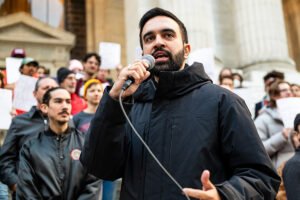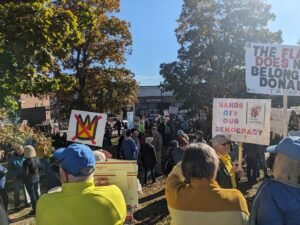
March 28, 2017; Bloomberg BNA
Those who want to require 501(c)(4) nonprofit organizations to make public who is paying for their election-related activities got some good news last week. A federal district court judge in Washington, D.C. ruled that a suit challenging a Federal Election Commission rule permitting donor secrecy could proceed to an actual trial.
Earlier this month, NPQ noted the increasing importance of “the dividing line between ‘social welfare’ and ‘political action.’”
Unlike political organizations, 501(c)(4) social welfare organizations can raise and spend unlimited amounts of funds while granting their donors anonymity. All they need to do is to keep their political activities to less than 50 percent of their annual effort.
Meeting this very low threshold is all that’s needed for an organization to keep the IRS happy. Moreover, the threshold itself is ill defined; for example, as there is disagreement over what constitutes political activity as well as whether political activity should be measured annually or over an election cycle. A 2013 attempt by the IRS to establish definitions was met with a firestorm of protest from the political left, right, and center. The suit now moving forward does not challenge the IRS’s regulations. Rather, it seeks to bring politically active 501(c)(4)s into compliance with Federal Election Commission regulations that require political organizations to identify their donors.
Sign up for our free newsletters
Subscribe to NPQ's newsletters to have our top stories delivered directly to your inbox.
By signing up, you agree to our privacy policy and terms of use, and to receive messages from NPQ and our partners.
Citizens for Responsibility and Ethics in Washington (CREW) filed the original FEC complaint against Crossroads GPS for its campaign-related activities in the 2012 election cycle. Bloomberg BNA reports that CREW had asked the FEC to require Crossroads to identify the source of “a $3 million contribution for the explicit purpose of supporting Josh Mandel, a 2012 Republican U.S. Senate candidate in Ohio. The identity of the contributor has never been revealed—a fact that CREW alleges is a violation of FEC rules requiring disclosure of money given to influence a campaign.”
This gift had served as a matching grant for other donors, which ultimately provided more than $10 million for TV advertisements in several states. In 2016, the FEC denied CREW’s request because it concluded that the moneys raised were not for a specific advertisement. CREW appealed to the district court; that suit can now proceed and consider whether the FEC ruling was, in fact, too narrow.
Crossroads GPS was formed, according to Open Secrets, “to serve as an alternative to its sister organization, a super PAC called American Crossroads, for donors who didn’t want their identities disclosed to the public. As one of its cofounders, Carl Forti, said at the time, ‘You know, disclosure was very important to us, which is why the [super PAC] was created. But some donors didn’t want to be disclosed, and, therefore, the (c)(4) was created.’” Its nonprofit status, which conferred donor anonymity, was so important to its strategy of raising funds for its political objectives that it fought the IRS for almost six years to reverse an initial IRS ruling that its activities were too political to qualify as a tax-exempt nonprofit organization.
In looking at the details of the CREW case, how “political activity” is seen from a layman’s perspective seems very different when viewed through the eyes of the FEC. CREW based its suit on Crossroads GPS showing donors “example” campaign ads at a 2012 fundraising event and then soliciting money from them “with a pitch that said their contributions were needed to pay for the rising cost of broadcasting such ads. Crossroads GPS subsequently ran campaign ads…echoing the claims and arguments made in the ads shown at the fundraiser.” In ruling against CREW, the FEC found that because donors were not shown the specific ads that aired, their donations did not cross over into the territory of campaign giving.
If the FEC’s ruling is ultimately upheld, the hundreds of millions dollars that, post-Citizens United, “social welfare” organizations of all persuasions use to influence election outcomes will remain opaque to public scrutiny. Dark money neither improves the political process nor makes our democracy stronger. The bending of the purpose of nonprofit organizations so that they can be aggressively partisan political entities does the nonprofit sector no good, either. Yet, at least for now, the anonymous funding pipeline that 501(c)(4) status enables remains wide open pending the outcome of years more of federal litigation.—Martin Levine











